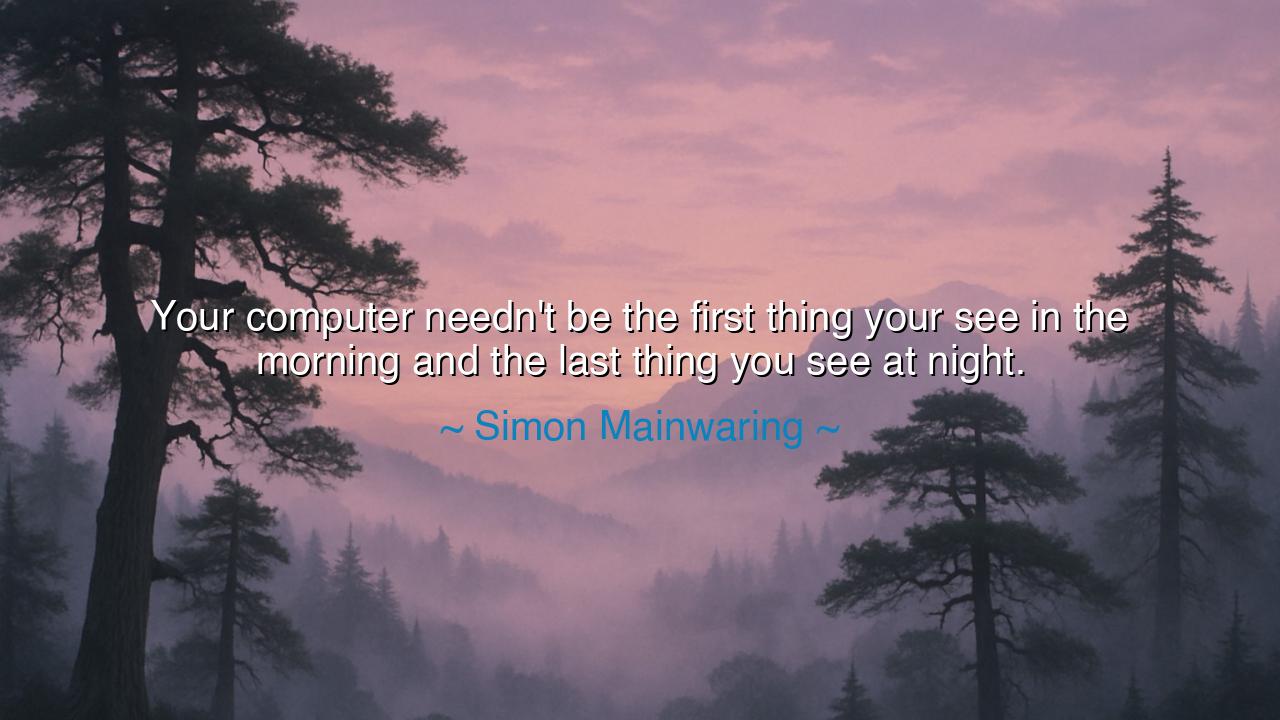
Your computer needn't be the first thing your see in the morning
Your computer needn't be the first thing your see in the morning and the last thing you see at night.






In the age of technology, where every moment is punctuated by the glow of a screen, Simon Mainwaring’s words serve as a powerful reminder: “Your computer needn't be the first thing you see in the morning and the last thing you see at night.” These words strike at the very heart of our modern existence, where we often find ourselves tethered to our devices, allowing them to dictate the rhythms of our day. With these few words, Mainwaring calls upon us to reflect on the balance between our digital lives and our human experience. The computer, with all its wonders and conveniences, should never become the dominating force in our lives, pushing aside the quieter, more profound moments that truly define our humanity.
In an era of constant connectivity, it is easy to lose sight of the beauty that exists beyond the screen. The first light of dawn, the gentle whisper of the wind, the smile of a loved one—these are the moments that should greet us when we rise. Yet, how often do we wake to the buzzing of notifications and the glare of a screen, only to fall asleep at night with the same screen still in our view? In a sense, we have allowed the digital world to infiltrate even the most sacred hours of our lives, those moments that should be spent in reflection, peace, or connection with the world around us.
Mainwaring’s quote is an invitation to return to the sacred. It is a call to recognize that life is more than the constant hum of digital devices—it is about feeling the pulse of the earth, breathing in the quiet, and experiencing the fullness of human interaction and connection. As the ancients taught us, the cycle of life is shaped not only by our actions but by the quiet spaces between them. Homer, in his epic tales, often emphasized the importance of silence and reflection in moments of great trials and victories. He understood that the human soul requires solitude, reflection, and time to truly be.
Consider the life of Socrates, the great philosopher who spent much of his days not in front of a screen, but in quiet discourse with those around him. He sought knowledge, not from the endless scrolling of information, but from the dialogues of real human interaction. Socrates knew that true wisdom was not about consuming knowledge but about reflecting on it, pondering its deeper meaning, and allowing it to shape your actions. In this way, he embodied a principle that we must strive to live by today: Balance—the balance between the digital and the real, between the external world and the inner world of the mind.
The power of Mainwaring’s insight comes from its simplicity. It speaks not only to the dangers of overconsumption of technology but to the essential nature of what it means to be human. In the ancient traditions, we find that great philosophers and thinkers always sought a life of balance—one that did not bow before external forces, but rather, one that allowed the soul to breathe, to think, and to connect with the deeper truths of existence. The computer, like any tool, is only as powerful as the way it is used, and in the hands of one who allows it to dominate every aspect of their life, it can be a force of distraction rather than enlightenment.
A real-life example of this can be seen in the life of the Dalai Lama. Despite the global reach of modern technology, he remains grounded in the wisdom of ancient traditions. His daily rituals, focused on meditation, mindfulness, and human connection, are far removed from the digital rush that so often governs our days. He teaches us that true peace and clarity come not from constantly checking our phones, but from spending time in stillness, in contemplation, and in human connection. This, too, is what Mainwaring hints at in his words. The computer, while an invaluable tool, should never replace the sacred rituals that allow the human spirit to flourish.
Lesson for the ages:
Let us heed the call of Mainwaring and Socrates—to wake each day with the sun and not with the cold light of the screen. Let us disconnect from the digital world, if only for a moment, and reconnect with ourselves and those around us. Balance is the key to living a life full of meaning and depth. Let not the first and last moments of our days be consumed by the artificial light of technology, but by the natural rhythms of the world.
Practical Action:
As you rise each morning, resist the urge to check your phone or computer first. Spend the first moments of your day in silence, in reflection, or in communion with nature. Disconnect before bed—put your devices away at least an hour before sleep. Use these moments to reflect, read, or engage in deep conversation. Let the power of human connection, of stillness, of peace, shape your life in a way that screens never can.






AAdministratorAdministrator
Welcome, honored guests. Please leave a comment, we will respond soon